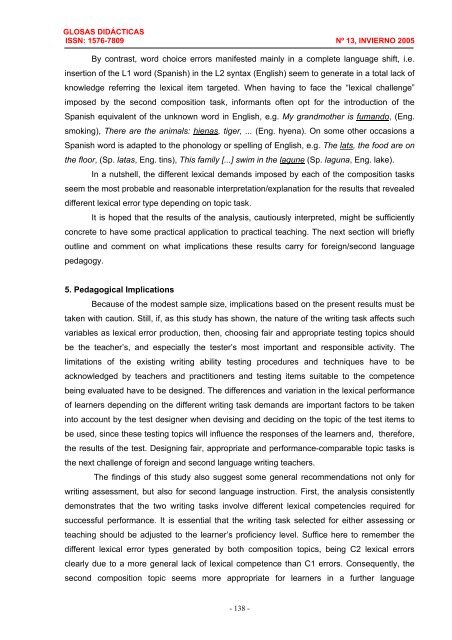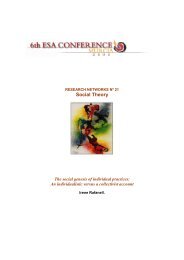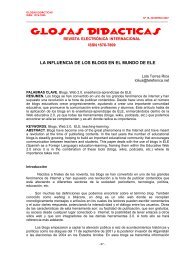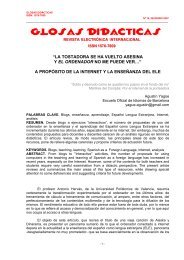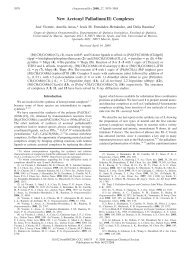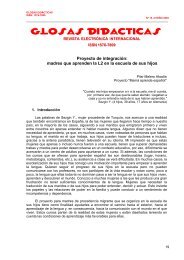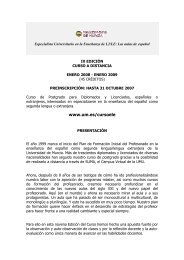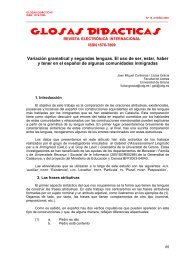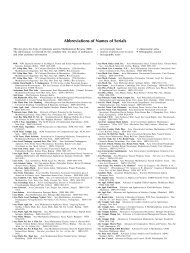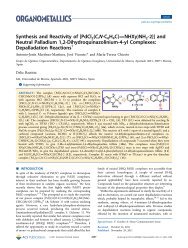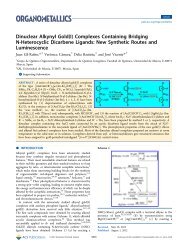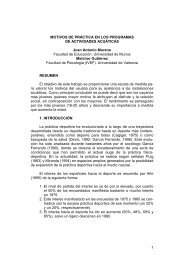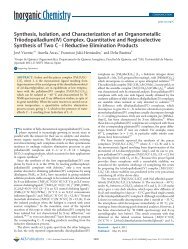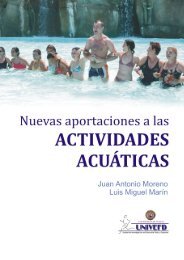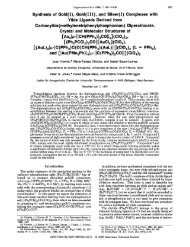descarga del número 13 de glosas didácticas completo
descarga del número 13 de glosas didácticas completo
descarga del número 13 de glosas didácticas completo
You also want an ePaper? Increase the reach of your titles
YUMPU automatically turns print PDFs into web optimized ePapers that Google loves.
GLOSAS DIDÁCTICAS<br />
ISSN: 1576-7809 Nº <strong>13</strong>, INVIERNO 2005<br />
By contrast, word choice errors manifested mainly in a complete language shift, i.e.<br />
insertion of the L1 word (Spanish) in the L2 syntax (English) seem to generate in a total lack of<br />
knowledge referring the lexical item targeted. When having to face the “lexical challenge”<br />
imposed by the second composition task, informants often opt for the introduction of the<br />
Spanish equivalent of the unknown word in English, e.g. My grandmother is fumando, (Eng.<br />
smoking), There are the animals: hienas, tiger, ... (Eng. hyena). On some other occasions a<br />
Spanish word is adapted to the phonology or spelling of English, e.g. The lats, the food are on<br />
the floor, (Sp. latas, Eng. tins), This family [...] swim in the lagune (Sp. laguna, Eng. lake).<br />
In a nutshell, the different lexical <strong>de</strong>mands imposed by each of the composition tasks<br />
seem the most probable and reasonable interpretation/explanation for the results that revealed<br />
different lexical error type <strong>de</strong>pending on topic task.<br />
It is hoped that the results of the analysis, cautiously interpreted, might be sufficiently<br />
concrete to have some practical application to practical teaching. The next section will briefly<br />
outline and comment on what implications these results carry for foreign/second language<br />
pedagogy.<br />
5. Pedagogical Implications<br />
Because of the mo<strong>de</strong>st sample size, implications based on the present results must be<br />
taken with caution. Still, if, as this study has shown, the nature of the writing task affects such<br />
variables as lexical error production, then, choosing fair and appropriate testing topics should<br />
be the teacher’s, and especially the tester’s most important and responsible activity. The<br />
limitations of the existing writing ability testing procedures and techniques have to be<br />
acknowledged by teachers and practitioners and testing items suitable to the competence<br />
being evaluated have to be <strong>de</strong>signed. The differences and variation in the lexical performance<br />
of learners <strong>de</strong>pending on the different writing task <strong>de</strong>mands are important factors to be taken<br />
into account by the test <strong>de</strong>signer when <strong>de</strong>vising and <strong>de</strong>ciding on the topic of the test items to<br />
be used, since these testing topics will influence the responses of the learners and, therefore,<br />
the results of the test. Designing fair, appropriate and performance-comparable topic tasks is<br />
the next challenge of foreign and second language writing teachers.<br />
The findings of this study also suggest some general recommendations not only for<br />
writing assessment, but also for second language instruction. First, the analysis consistently<br />
<strong>de</strong>monstrates that the two writing tasks involve different lexical competencies required for<br />
successful performance. It is essential that the writing task selected for either assessing or<br />
teaching should be adjusted to the learner’s proficiency level. Suffice here to remember the<br />
different lexical error types generated by both composition topics, being C2 lexical errors<br />
clearly due to a more general lack of lexical competence than C1 errors. Consequently, the<br />
second composition topic seems more appropriate for learners in a further language<br />
- <strong>13</strong>8 -


